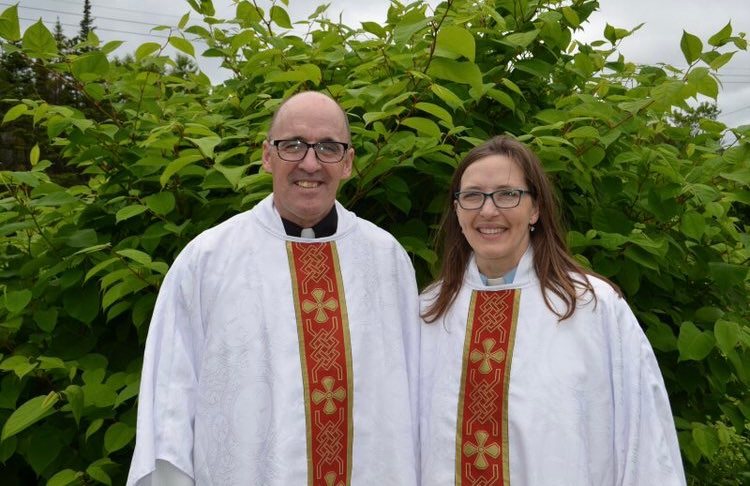- Home
- simply catholic
- Married Clergy
Simply Catholic and Welcoming You
Having Married Clergy in the Church

Archbishop Philip and Bishop Charlene Bradley - a Married Couple Outside Following Mass
Having married clergy in the church can bring advantages like relatable experience in marriage and family life, a built-in support system, and the potential for greater empathy and understanding of parishioners' needs. However, challenges may also arise, such as the need for adequate compensation (in churches with ‘paid clergy) and potential dual responsibilities to family and church.
Potential Advantages:
Relatability and Empathy:
Married clergy can draw on their personal experiences in marriage and family life to connect with parishioners facing similar challenges and joys, particularly in areas like premarital and marriage counseling, or parenting.
Every married couple faces challenges in their marriage, financial, health, kids rebellion, even simply maintaining their relationship as each grows and changes as a person, etc. Married clergy live these experiences on the daily which can empower them to relate to their congregation in ways that celibate clergy simply never could.
Built-in Support System:
With married clergy, a spouse and family can offer a vital source of support for a priest, helping them navigate the stresses of ministry and providing a loving and stable home environment. This can be further strengthened in families where both spouses are priests/clergy as each then can also personally relate to and share their clergy/ministry journey.
The Roman Catholic stance is that celibate priests can be more fully devoted to the service of God and their parish since their commitment is not divided between the Church and their wife and family.
Experientially we cannot agree and, when comparing married and celibate priests we find no support for this claim. Compared to celibate priests, we find married priests devote more time, not less, to prayer and work, and are more satisfied in their ministry and faithful to Church doctrine. Rather than a distraction, their spouses encourage and support them to devote themselves even more fully to Church ministry.
Greater Understanding of Parishioners' Needs:
Married clergy may be better equipped to understand and address the needs of families within the congregation, especially regarding parenting and family life. Marriage and parenting do not come with an instruction manual.
Shared lived experience can be a huge asset especially for couples who do not have the blessing of a supportive family of their own to draw from. In such cases the security of the clergy seal of total confidentiality as well as married clergy’s relatability can provide much needed support to families who feel they have nowhere else to turn for understanding, sometimes advice.
Potential for Increased Church Membership:
Some believe that a married clergy could attract more young couples and families to the church, as they may feel more understood and represented. Celibate clergy are often revered and respected but not seen as actually ‘getting’ the issues faced in the trenches of marriage. Many couples relax when working with married clergy simply because of that shared lived experience.
Potential Challenges:
Financial Strain:
In some denominations, particularly those where parishes are responsible for clergy compensation, supporting a clergy family can be a significant financial burden on the congregation.
However in churches such as St. Brigit’s Community Catholic Church and others from Old Catholic origins, clergy are unpaid by the church and specifically expected to “not be a burden to their congregations”, by being self-supporting via secular employment, being in business for themselves or otherwise having a career aside from their ministry.
For example my personal background was in law enforcement and as a defensive tactics/use of force and legal academics instructor with advanced black belt standings up to 5th and 6th degree black belt/dan rankings in multiple martial arts disciplines. Admittedly a somewhat unusual career choice for clergy.
My wife, Charlene has a background specialty in Human Resources. I am now 'retired' wile my wife continues to be a substitute teacher in the local schools, we support ourselves and our ministry primarily through our pensions.
In some larger, established parishes/churches, clergy may be able to support themselves, or at least supplement their income, through officiating at a significant number of weddings and funerals. Clergy are usually paid directly by wedding planners and funeral directors for their services in these areas.
Most mainstream churches also charge separately for weddings and funerals often with clear set amounts separately for the cleric and for the venue when the church is used for these purposes.
Dual Responsibilities:
Married clergy may face challenges balancing the demands of their family life with the responsibilities of their ministry, potentially leading to stress and fatigue. Self care and time management are critical components of ministry, especially when also managing marriage and family life.
Potential for Secrecy and Compromise:
In some cases, mandatory celibacy can lead to clandestine relationships and a culture of secrecy, which can compromise a priest's integrity and ability to effectively serve the church. The demand for celibacy has a documented history of contributing to abuses and cover-ups by many churches.
A point which I feel must be made is that the seal of the confessional and the seal of the clergy collar applies even between spouses. What is shared between people and their clergy remains theirs and cannot be shared, except with explicit permission of that person. Not even between married clergy.
Both the seal of the confessional and the seal of the collar remain absolute. Clergy who breach this sacred trust will no longer be clergy.
Having Married Clergy in St. Brigit’s Community Catholic Church

Archbishop Philip and Bishop Charlene Bradley in a Lighter Moment, Outside after Mass When Philip "Dips" his wife Charlene.
At St. Brigit’s Community Catholic Church I am truly blessed to share my priesthood journey with my wife Charlene, with both of us being married clergy. While conducting our ministry we have raised three daughters, faced significant challenges and continued to grow stronger as a couple and as clergy. Our callings, ministry and our family are stronger now than ever.
We co-celebrate mass more often than officiating solo mass. Say our Divine Office and Rosaries together. Simply put, our ministry is very much part of our marriage and we believe that Christ is our partner in both our marriage and our ministry. We couldn’t even imagine it any other way.
For us there is real truth in the old adage that “the family that prays together stays together”. We are huge proponents of families getting together at least once each day to pray as they see fit. We do recommend the Rosary as our go to family prayer.
We find that many families, young and old, seem to use us/clergy most as a sounding board when exploring family issues. They aren’t actually looking for advice, more just someone they can share things with so that, in the sharing they can gain a better grasp of their own issues and solutions.
Being able to relate, even share similar experiences, provides a platform wherein they are reassured, heard and comforted so as to go on about raising their family in their own unique way. Unsolicited advice is most often unwanted as well as unwarranted.
The urge to ‘fix’ other peoples problems or to tell them how to fix their issues is best resisted. Most people actually have their own very workable solutions. They just need to talk or share to feel supported as they move forward.
Only offer advice if they actually ask for it and frame it carefully so as not to make it seem like instructions. We are spiritual leaders. Marriage counselors are a profession all their own.
Don’t cross the streams. Be a priest. Be a friend, a brother or sister in Christ. Build their confidence in their own abilities. Don’t make them even somewhat dependent on your solutions.
Remember, if people don’t uplift you they don’t deserve you. This includes clergy. Our job should always be to build others up in the kingdom of God. Unsolicited advice may be both unwanted and undercut someone else’s confidence in their own God given abilities.
If in doubt, how best to proceed, try to model behaviours rather than talk about them. People tend to naturally copy what they see as working or desirable without feeling that someone else ‘put that on them’.
Most people seek clergy support and reassurance, not “Fixers”!
Recent Articles
-
The Basic Catechism of the Catholic Church
Feb 12, 26 11:03 AM
A basic catechism of any rite or branch of the catholic church acts as a primary reference for teaching the faith -
The Divine Office
Feb 07, 26 11:07 AM
The Divine Office The Divine Office, also known as the Liturgy of the Hours or Opus Dei ("Work of God"), is the official, daily set of prayers of the Catholic Church -
Women Being Removed or Voided from Scriptures
Jan 17, 26 05:06 PM
The concept of women being "removed" or "voided" from scriptures refers to both the physical exclusion of female narratives in historical texts...
Boat Harbour West, Newfoundland, Canada. Cell Number 709-276-0626
Join Us Also on Our St. Brigit's Community Catholic Church Prayer group on Facebook: https://www.facebook.com/groups/324523956473448


